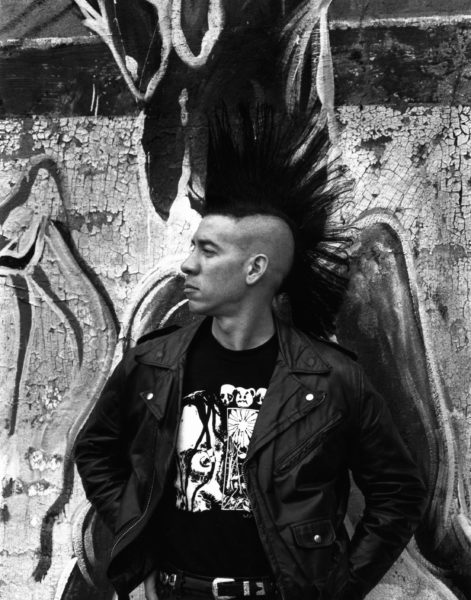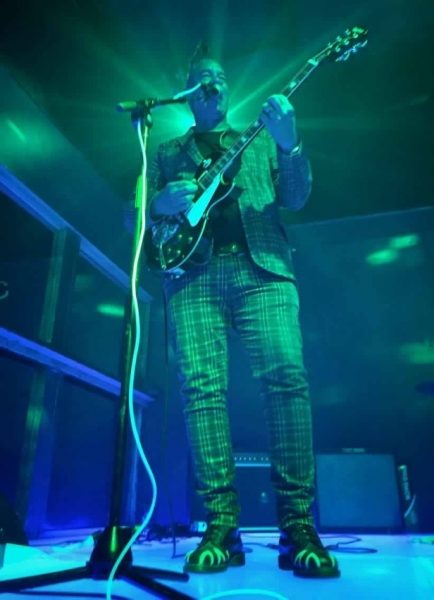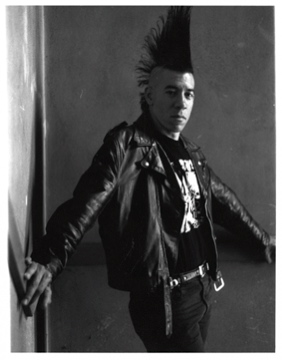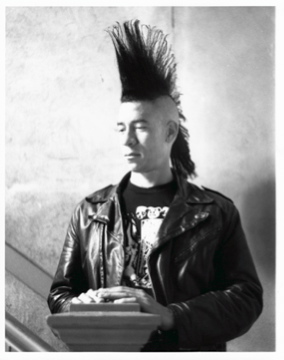Time to Help Out: A Benefit for Christian Kidd & A Long-Delayed Interview
 Earlier this spring, some truly devastating news broke that Christian Kidd, founder, singer, songwriter, and guitarist for The Hates, Houston’s longest-running punk band, a band that’s been around since the late ’70s — no mean feat, in a town where bands rarely survive more than five years at a stretch — had been diagnosed with cancer.
Earlier this spring, some truly devastating news broke that Christian Kidd, founder, singer, songwriter, and guitarist for The Hates, Houston’s longest-running punk band, a band that’s been around since the late ’70s — no mean feat, in a town where bands rarely survive more than five years at a stretch — had been diagnosed with cancer.
According to news reports, he’d gone to the doctor for shoulder surgery but couldn’t seem to get better afterwards; further examination found a tumor in his mouth, Stage 3 squamos cell carcinoma, a form of skin cancer. At that stage, the cancer has spread into either the facial bones or, as it sounds like in this case, to one or more lymph nodes.
Being somebody who’s been involved in the music scene here for a while now, the news hit me like an actual punch. I cannot imagine a Houston without Christian Kidd in it; he’s an integral part of this place, to me. When I was a wide-eyed college kid from a podunk Army base, living in The Big City for the first time, Kidd was an emblem of the city itself, this big, imposing guy with the giant Mohawk looked like every punk rocker I’d ever heard about.
Heck, even when I wasn’t at a club, I’d see him around, blazing down the road on his scooter or — back when he worked for the gas company — even in my own damn backyard, checking the meter. One of the happiest moments playing in my own band was when we got to share a side stage with The Hates one year at Westfest; we were playing alongside a legend.
In my brain and heart, Kidd’s always, always been here — he’s an icon, in the truest sense of the word, a larger-than-life figure who’s been omnipresent in Houston’s musical life for forty freaking years. Think about that: forty. The man’s been a punk rock hero nearly as long as I’ve been alive.
And now, he needs our help. He needs your help. Fighting cancer, frankly, costs money — the treatments cost money, the recovery costs money, the future medical care costs money.
To help out, Kidd’s friends have rallied behind him, led by H-town punk rock documentarian David Ensminger and Free Press Houston music writer David Garrick. Sadly, I missed Ensminger’s “Rock for Light” benefit last month, but Garrick’s got a full week of good-hearted bands donating their time and energy this week, starting this past Monday, June 12th, and running on through Sunday, June 18th.
 Tonight, the benefit show is at Rudyard’s, with some seriously excellent people, like popsters {Arthur Yoria} and {Chase Hamblin}, folkie-turned-indie-rocker {Adam Bricks}, nighttime electro-pop people {Bang Bangz}, and sweetly serene roots-pop band {Dollie Barnes}. Check out the event page for details on the other nights remaining this week — the whole thing promises to be amazing, and the more people that come out, the better. Kidd deserves it, well and truly.
Tonight, the benefit show is at Rudyard’s, with some seriously excellent people, like popsters {Arthur Yoria} and {Chase Hamblin}, folkie-turned-indie-rocker {Adam Bricks}, nighttime electro-pop people {Bang Bangz}, and sweetly serene roots-pop band {Dollie Barnes}. Check out the event page for details on the other nights remaining this week — the whole thing promises to be amazing, and the more people that come out, the better. Kidd deserves it, well and truly.
Beyond being a musician, the man also happens to be a writer and, unlikely as it might seem, a poet. A few years back, he released a book, written with wife Alexis Kidd, entitled Just a Houston Punk. It’s a fascinating read for anybody into music, and especially for somebody interested in the history of Houston music specifically; it’s one of those rare books where I finished it and was disappointed that it didn’t go on for another 100 pages.
Back in 2013, when it was released, SCR contacted Kidd and was able to do a brief little interview with him about the book, The Hates, and his whole life up to that point. Unfortunately, things got in the way, as they sometimes do, and much to my chagrin, it fell by the wayside.
Now, though, seems like an opportune time to finally post the interview. So here goes — any mistakes are mine alone, and I’d like to offer a profound “thank-you” to Christian, both for the talking to us and for being the inspiration he is, and a heartfelt apology for not doing this until now.
Talking With the Gasman About Poetry, er, Writing: An Interview with Christian Kidd
SCR: Why now? What prompted you to want to write a book?
Christian Kidd: When Jef With One F self-published his book about his time with the Black Math Experiment, he basically called me out to write my own story. I didn’t really take it seriously at first, but after a little while of kicking it around my wife started to encourage me further, even offering to help me put the book together. Before Jef mentioned it, I’d never considered doing anything like that before — I never considered that my adventures might have been of interest to anyone besides me.
Do you have any plans to shop the book around to a publisher, or was the plan all along to go the DIY route?
We knew from the start that we wanted to self-publish. It would kind of be the literary equivalent of putting out my music on my own label over the years.
 One thing I wished you’d gone into a bit more was the pre-punk days of your youth; were you always into rock & roll of some kind?
One thing I wished you’d gone into a bit more was the pre-punk days of your youth; were you always into rock & roll of some kind?
My mother was from Panama, so as a young boy I was surrounded by Latin, Caribbean, and reggae music. In fact, when my mother first gave me a guitar, she hoped that I’d end up getting into salsa music. It wasn’t until I was a teenager that I discovered radio-friendly music, which eventually led me to prog-rock, glam-rock, and then punk.
In the book, you kind of jump in at the point where you were already searching for obscure punk records. How did you first get into punk, specifically?
When I was exploring music for myself, I ended up heavily into prog-rock. Because local music stores didn’t really carry that sort of thing, I ended up getting the bulk of my music from two mail-order services — Gem in New Jersey and Systematic in Berkley, California.
Back then, you’d send them your money and tell them what album you wanted to order, and they’d have you pick a second record as an alternative in case what you’d originally asked for had sold out. I never picked an alternative, so the staff would just choose for me. I’d end up with all kinds of seemingly random things that kept me fascinated.
I had Joy Division‘s first release, which was under the name of Warsaw, early material from Siouxsie and the Banshees and the Cure. In fact, the Cure’s first bassist ended up playing in a punk band called Lockjaw. I had that recording, too. I still have vinyl from a Scottish group Johnny and the Self-Abusers, who went on to become Simple Minds, a little Irish band called Radiators from Space, who eventually became the Pogues, and the Killjoys, who reformed in the late ’80s as Dexy’s Midnight Runners.
In addition to my record obsession, I’d read all of the British music magazines that I could get my hands on to learn more about what was up-and-coming. Between the vinyl and the music rags, I eagerly delved into the glam-rock chapter of musical history, and then fell in love with punk. It was an easy leap.
It’s mind-blowing to me how much you’ve seen of the ebb-and-flow of music in this city, especially since you were around in the era before I even got here, when places like The Island were in full swing; do you miss those days at all?
Yes, and no. Those days were so exciting — everything was new and there were no rules yet. You could put together a band and just do whatever you wanted to do and nobody could say you weren’t punk because punk was just being born here. But on the other hand, I am so focused on the great things about today and the possibilities for tomorrow that the past is mostly just a great bunch of memories.
Do you still see or hang out with any of the crowd from back when you were coming up?
I’m in touch with several former bandmates, including past members of the Hates: Mike McWilliams from Guyana Boys Choir, Ed Felch from Christian Oppression, Robert Kainer, Screech, and Dave Dittemore. With [2014’s] Island Reunion show, I’ve been fortunate to reconnect with Jerry Anomie of Legionaire’s Disease, Mike May from Vex, Allison Klein and Steve Armstrong of Bevatron, Stew Canon of AK-47, and Gary Yokie of Ruse. It’s really great to be able to be in touch with these people.
What do you think about Houston’s punk scene nowadays? Any bands you particularly like?
I’ll be honest, I don’t really get out all that much — these days I’m sort of a homebody. It’s been a long time since I’ve gone out to see any kind of show, much less a punk gig. But I am grateful that there’s new blood out there. It means the world to me that punk never really died, especially in my hometown.
 How about this city as a whole?
How about this city as a whole?
I have always had a great love for this city, and always will. In my lifetime I’ve traveled around the world, but Houston will always be my home.
This is probably going to sound a little stupid — or, hell, maybe a lot stupid — but why the most recent name-change, to Kidd?
As you might have read by now, my wife Alexis has Mesothelioma, an incurable cancer. Before we were married, we spent a lot of time in and out of Methodist hospital while her doctors found a way to help her, which ended up with her undergoing a major surgery and a round of specialized chemotherapy.
From the very first time she went in for an exploratory surgery, all of the hospital staff would call me Mr. Kidd — her last name. I used to joke with her about it, and I teased her relentlessly about how when we got married that I should just take her name so that they would have it right. She is so brave to endure what she has, that I thought it would be a fitting tribute to her. She inspires me every day — it was the absolute least that I could do to honour her. And besides, doesn’t “Christian Kidd” sound like an awesome pirate’s name?
How do you think you’ve progressed, songwriting-wise, since those early days?
I am proud of what I did in those early days — to me, those first songs are just as relevant and potent as they were when I first wrote them. But back then I didn’t really know a great deal about music theory, and I knew too little about guitar playing. Over the years I’ve taken guitar lessons, learned a great deal about music in general, and with that knowledge I’ve even gone back and added to those early songs.
For example, I was not the best lead player on the planet in the early ’80s, but since then I’ve added solos to songs that originally had none. I really enjoy taking influences from other musical genres that have different kinds of chord structures and applying them to my music. It makes it a lot more fun for me.
Do you ever look back and think about any missed opportunities, music-wise? Was there anywhere else you wanted the band to go that just didn’t pan out?
I’ve had opportunities to take my music to LA, or even New York, but as I’ve said before, Houston is my home. I couldn’t imagine ever living anywhere else. So, no regrets.
Did you have a favorite place to play, out of all the places you’ve played?
It’s hard to answer that question after almost 35 years of playing all around the city, the state, and across some parts of the country as well. Every venue, every show has something amazing about it — even if it was in the dumpiest dive or if there were less than 10 people in the audience. I can say that I’ve recently enjoyed playing Walter’s and Rudyard’s; the sound guys at both venues are friendly and make us sound great.
What was your absolute favorite, best-in-the-universe show ever, either one The Hates played or that you went to see?
Another tough one. I’ve tried to catalogue every show that the Hates have ever played, but unfortunately a lot of early shows dates have been forgotten because when I first started I honestly wasn’t thinking about any kind of longevity. I can tell you that as far as recent gigs go, I really got a kick out of playing the Island Reunion show. We worked up a set of songs only from the early ’80s, and it was really intense to play/sing those songs again. Some of them I’d not performed in over a decade. I had so much fun that night, we’ve incorporated some of those old chestnuts into our sets since. END



Leave a Reply